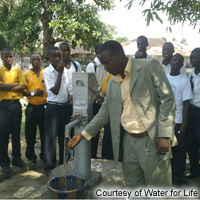Water for Life

Project Information
Constructing wells to provide clean water and toilets to improve the living standards in communities
Describe the need affecting community
How will this Advance project help to address the need?
The Water for Life project is a grassroots initiative and seeks to address the water and sanitation needs of the affected communities through the following means: Seek resources (funding) for the construction of 40 wells and 30 toilet facilities within communities and schools . Those communities include: Bong, Maryland, Grand Bassa, and Gbapolu Counties. 2. Set up community structures and leadership that will supervise and coordinate the wells and toilets. 3. Strengthen existing community structures and leadership for the supervision and proper management of the facilities. 4. Mobilize, train, and educate the various communities on water and sanitation and other developmental initiatives. 5. Promote the rights to access clean and safe drinking water, good sanitation facilities, health, and development at the grass-roots level in post-war Liberia.
Describe the primary goal of the project
Seek resources (funding) for the construction of wells/hand pumps and toilet facilities within communities. Other long term impact includes: Set up community structures and leadership that will supervise and coordinate the wells and toilets. Strengthen existing community structures, and leadership for the supervision and proper management of the facilities. Mobilizing, training, and educating the various communities on water and sanitation and other developmental initiatives. Promoting the rights to access clean and safe drinking water, and good sanitation facilities, health, and development at the grassroots level in post-war Liberia.
Describe the change you would like to see in the community as a result of this Advance project
Some of the major changes that the project hope to make are: Community members, especially women and children will not have to walk long distances to fetch for water. The health of the beneficiaries will improve to some considerable extent. The availability of proper, and modern toilet facilities will stop the defecation into rivers and the bushes. The project will also promote peace, unity and community development.

